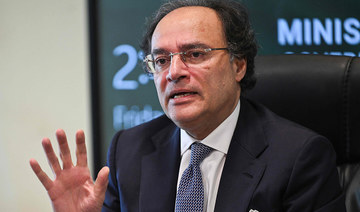BEIJING: The head of the International Monetary Fund on Sunday called on China to implement “a comprehensive package of pro-market reforms” to boost a sluggish economy beset by a housing market crisis, low domestic demand and persistently high youth unemployment.
Chinese policymakers have so far resisted calls to juice the economy through massive government stimulus, instead stressing the need to pivot toward “high-quality” growth.
Speaking at the China Development Forum in Beijing on Sunday, IMF Managing Director Kristalina Georgieva said the “transition from high rates to high quality of growth is the right fork in the road to take and China is determined to do so.”
The Bulgarian economist warned that “this transformation would not be easy,” but argued that “with a comprehensive package of pro-market reforms, China could grow considerably faster than a status quo scenario,” according to an official transcript of her speech.
Beijing should take “decisive steps” to reduce the amount of unfinished housing and give more space for “market-based corrections” in the crucial but heavily indebted real-estate sector, Georgieva said.
Authorities should also boost “the spending power of individuals and families” by beefing up China’s pension system and taking other steps to hone its vast social security apparatus, she added.
Georgieva also pushed China to strengthen “the business environment and (ensure) a level playing field between private and state-owned enterprises.”
Top Chinese politicians have been bullish on the economy, with Premier Li Qiang telling Sunday’s forum that Beijing would “take practical, effective actions to promote high-quality development and inject positive energy... into the global economic recovery.”
But gross domestic product growth rates in China have been trending downward for years, and Beijing this month set an annual target of “around 5 percent” — significantly lower than the breakneck expansion rates that powered the country’s meteoric rise to prosperity.
Sunday’s forum was attended by some of the world’s highest-profile business figures, including Apple’s Tim Cook, who said he had enjoyed an “outstanding” meeting with Li.
“I think China’s really opening up, and I’m so happy to be here,” the CEO of the US’ largest smartphone empire told a reporter from CGTN, according to a video posted on one of the state-run broadcaster’s social media accounts.
In separate comments published online by state broadcaster CCTV, Cook said Apple would keep increasing its investment in research and development in China.
He added that Apple’s flagship mixed-reality headset, the Vision Pro, would hit shelves in China by the end of this year, according to a social media post that carried his remarks in Chinese translation only.
Cook was in Shanghai to open a new Apple store this week, and on Friday discussed the company’s expansion plans in China with the country’s commerce minister, Wang Wentao.


















